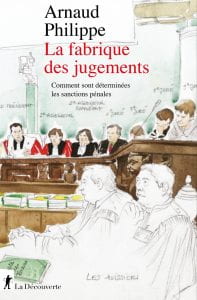 Do tougher punishments really deter crime? The School of Economics’ Arnaud Philippe tells us what happened when the French government introduced harsher sentences for repeat offenders in 2007.
Do tougher punishments really deter crime? The School of Economics’ Arnaud Philippe tells us what happened when the French government introduced harsher sentences for repeat offenders in 2007.
By Michelle Kilfoyle
We’re all used to hearing politicians’ battle cries to get tough on crime. It was certainly one of Nicolas Sarkozy’s big election promises to voters back in 2007.
And if you followed Sarkozy’s moves at the time, you may remember that his first big deed as France’s president was a change in the law to deter criminals from committing repeat offences of the same kind, be it theft, assault or drug dealing.
But did it work?
Arnaud Philippe, associate professor in the School of Economics, delves into the controversial reform in his new paper: Learning by offending: How do criminals learn about criminal law? (accepted by AEJ: Economic Policy).
His study tackles a tricky conflict between politics and society. Arnaud talks to us about why the policy ultimately failed the people of France, and explains how his career has taken him from teaching maths to prisoners to teaching judges how to make better decisions.
Why did you choose to study this policy?
I’ll have to give you my life story to explain this. It all started when I was a student and volunteering in prisons in France back in 2008 and 2009. I taught maths to the inmates and organised social events like football tournaments and board game sessions. I enjoyed it so much, that I became president of the French association for student volunteers in prisons, called GENEPI, for a year.
In 2007, the government introduced the reform to reduce recidivism, which is where people keep committing a similar type of crime. Sarkozy considered recidivists to be one of the most annoying groups in society. A judge has already told them that their crime is bad, yet they keep doing it.
Before the reform, the minimum possible sentence was zero years for recidivists who had committed relatively serious crimes, like assault and theft, but not as serious as murder or rape, say.
Judges could choose whether to allow zero years or impose something more, depending on the case. However, Sarkozy’s reform mandated a minimum sentence of between one and four years for these types of offenders.
While I was working in the prisons, I was curious about the new law. Would it really do enough to lower crime rates to justify the costs of sentencing more people? The government said the law was great. But most judges and legal professionals thought it was bad because they’d seen that super tough-on-crime policies in the US, and to a lesser extent in the UK and the rest of Europe, had been unsuccessful.
I wanted to find out the answers, and I wanted to work on crime and the criminal justice system. For me, this meant switching to a social science for my studies. I had a degree in biology and was part-way through a master’s in evolutionary biology. With my maths skills, economics was the ideal social science to transition to.
How did you find out the answers?
At the beginning of my economics PhD, I gained access to my core data from the French National Criminal Register. From this, I could see all the sentences handed out in French criminal courts before and after the 2007 reform for delits – the category of criminals who conduct relatively serious offences – and how their criminal careers evolved.
I kept analysing the data over the years, and up until my time here at Bristol. In my paper, I show trends in sentences between 2002 and 2016.
Was the policy effective?
Certainly not at first. Even though the policy had been one of Sarkozy’s very famous and well-advertised promises during his election campaign, there was no short-term change in recidivism rates.
This policy was targeted at people who are on the margins of decision-making, as in, they are deliberating: ‘Should I do the crime, should I not…?’. Of course, crime feels much less of a choice for plenty of other people. Nonetheless, if would-be recidivists were accurately informed, you would expect a portion of them to change their behaviour straight away.
But then when I looked at recidivists who had been punished once under the new law, they were actually less likely to commit that crime yet again. In the longer term, these offenders committed 0.16 fewer of the crimes on average.
So publicly available information wasn’t enough to change their behaviour, but first-hand experience of the reform was.
So was the policy change worth it?
No. It made very little difference to overall crime rates. Although recidivism fell slightly in the longer term, the people responsible kept committing other types of crime. And many more people were sentenced. Prison sentences for recidivists increased by 54% after the reform. Probation sentences went up by 140%.
The costs clearly exceeded the benefits when you account for the cost of imprisonment and probation – which is 10,000 euros per offender on average. In the end, the French people paid these high costs and, in return, got minimal benefit.
What are your main lessons for policymakers?
Firstly, fighting crime with harsher sentences is not great. The evidence is very mixed on whether they work and they’re very costly. There is stronger evidence that certain social policies are better at reducing crime, for example, supporting people who’ve had a sudden loss of income or housing homeless people. Simple behavioural training or summer jobs for poorer kids also work well.
Secondly, if you are going to use longer sentences as a deterrent, you need to make sure that the people you’re targeting are aware of them. Sarkozy’s campaign was targeted at voters, not criminals. It was more of a political promise than a real crime control policy. My study supports the idea that longer sentences are ineffective when citizens don’t know about them.
My final lesson is that governments need to be trustworthy and reliable. This is difficult, but if you change the criminal code every two days for political reasons, criminals won’t trust you to act on your threats and will commit the crime anyway. That’s disastrous – especially for citizens.
You’ve built up a strong body of research into crime and sentencing. How are you taking your findings back to the criminal justice sector?

I do a lot of work to help people understand how decisions are made in the courtroom, and what’s going on in the criminal justice sector. People in the sector are usually very interested in what I’ve got to say because it offers a different way of looking at things.
For the past two years, I’ve been providing on-the-job training for newly qualified judges in France based on my research. I show them how to look at their sentencing decisions and consider whether they might be biased in any way.
In 2022, I published a book, La fabrique des jugements (“The Judgment Factory”). It pulls together research on judges’ decision-making processes, including the work in this recidivist study, and I’ve been sharing that with judges.
And I’ve also written four policy briefs with the Institut des politiques publiques (IPP), including one dedicated to the impacts of Sarkozy’s recidivism policy.
I started the recidivism study nearly 12 years ago. I’m still investigating how people learn about crime, but it’s great to have finished that particular project and to now share what I’ve learned with other people.
Arnaud Philippe is associate professor in economics at the University of Bristol. You can read a draft copy of his new paper here: Learning by offending: How do criminals learn about criminal law?

